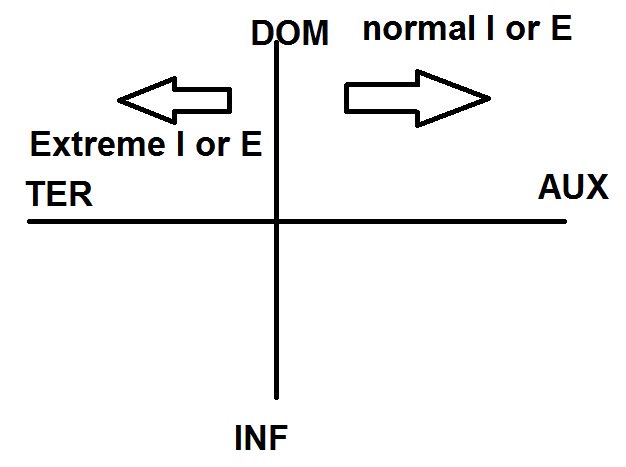Eric B said:
"if the general attitude of the consciousness is in the introverted attitude for instance, then the preferred functions are also in the introverted attitude"
Your mistake is assuming "the conscious functions" form a "block" of both dominant AND auxiliary (as "preferred", which is not used in this passage). If you're taking "the whole psychic process" that way, then the stack would be IIII or EEEE.
Obviously, he's talking about the conscious portion of the psyche (centered on the ego). What's unconscious is suppressed and falls into the unconscious attitude.
Here is my best understanding.
- Yes, Jung was ultimately vague on this issue in the following sense: he did not really think in Psychological Types of the idea of the attitude of a function as separate from the attitude of consciousness or that of the unconscious. He did think of Si, Te, and so on in the sense that he thought sensation in an introvert with dominant sensation looked a very particular way with special peculiarities as compared with a dominant sensation type who is an extravert.....but this is far from deciding all the questions about the idea of a function-attitude (as opposed to his relatively more separate treatment of function/attitude)
- The sense in which I think he DID strongly seem to lean to something *like* a NiTi FeSe is this: while in principle, Jung said there's one function alone which can be called conscious, he soon comes to apparently 'contradict' this
Jung said:
A grouping of the unconscious functions also takes place in accordance with the relationship of the conscious functions. Thus, for instance, an unconscious intuitive feeling attitude may correspond with a conscious practical intellect, whereby the function of feeling suffers a relatively stronger inhibition than intuition
by suggesting there's a grouping of the conscious dom-aux against the unconscious two.
Here by conscious functions, I take him to mean "practical intellect" aka sensation+thinking with thinking dominant resulting in stronger repression of feeling than intuition.
Now, I think he's not really contradicting himself so much as saying for practical purposes, we can say there are two conscious functions.
I think this attitude shows up elsewhere as well: in Ch. X, Jung seems to type Nietzsche as an introverted thinking type, despite his typing of him as a dominant intuitive of the introverted variety in Ch. III:
Jung said:
Just as Darwin might possibly represent the normal extraverted thinking type, so we might point to Kant as a counterexample of the normal introverted thinking type. The former speaks with facts; the latter appeals to the subjective factor. Darwin ranges over the wide fields of objective facts, while Kant restricts himself to a critique of knowledge in general. But suppose a Cuvier be contrasted with a Nietzsche: the antithesis becomes even sharper.
However, when understood from this practical attitude of regarding the top two as conscious, it becomes clear why Jung might refer to someone with auxiliary thinking who is also an introvert as an introverted thinking type. In Ch. III, Jung did mention Nietzsche's 'Ti' by mentioning his introverted intellectual side (evidenced in his aphoristic writings), by which in his language he's referring to introverted thinking..... but he never made the apparent 'mistake' of calling Nietzsche an introverted thinking type, a word we might assume is reserved only for a Ti-dom.
I think Marie-Louise von Franz often did the same thing -- talked of a 'thinking type' even when thinking seemed to be auxiliary, loosely, but I think this is because she felt often as a practical matter, you can only tell in a good many cases which is dom and which is aux based on the inferior, i.e. on theoretical/inprinciple grounds, not directly based on examining which seems to be greater.
In fact, I'd say a huge number of theorists do something like this -- while Beebe thinks of NiTe, not NiTi as dom-aux, it's pretty clear he thinks someone with dom-intuition/aux thinking will be pretty strong in those two even if in true principle they've only got one function-attitude associated to the ego complex.
So my best interpretation is this: If you interpret Jung as saying there's such a thing as a Ni-dom or Ti-dom, i.e. if you understand by that just having dominant intuition or thinking coupled with an introverted attitude, it's consistent with that to say he thought generally people would be NiTi, not NiTe. And to have this, you'd still need to add in the huge caveat that you're NiTi probably as a matter of practice, because in principle you can only be a Ni-type with auxiliary thinking and Se-inferior (again interpreting Ni, Se as he does).
That really doesn't mean what he MEANS by "being NiTi" is the same as what we might mean in our more functions-stacking-y language.
Now, this is just on figuring out what he thought. As for what I think is reasonable to do, I think there are good reasons to take seriously some of our modern ideas about NeTi and NiTe and so on. I prefer 8-function models like socionics that, instead of saying "you have Ti, not Te," instead suggest the role each of those plays in your psyche.
I can understand where Beebe for instance is coming from, if he's thinking 'well, if the dom is the only one that is conscious, according to Jung, it's a reasonable enough spinoff of Jung, even if not his own idea, to say the dom is associated to the ego complex, and the auxiliary onward to other complexes, since the ego-complex is what consciousness revolves around"
As for whether people understand that Jung differs significantly from a lot of modern practice, frankly I've been unimpressed and think it's well worth clarifying.

